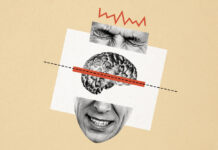In a new article published in Schizophrenia Bulletin, Bryony Sheaves and colleagues explore voice hearer’s experience of distress from listening to and believing derogatory and threatening voices (DTVs).
The researchers conclude that being able to disengage, not listen to, and/or not believe the voices could reduce psychological distress for voice hearers.
“Psychological strategies which enable voice hearers to disengage from listening to and believing derogatory and threatening content could have the potential to provide an innovative route to reduce distress,” they write.
 The authors questioned 591 voice hearers about distress and believing negative voices. 52% of participants believed their voices most or all of the time. The present work identifies 4 factors related to believing voices: active listening, passive listening, believing, and disregarding. Believing, active listening, and passive listening were correlated with higher levels of distress, with passive listening showing an especially high correlation.
The authors questioned 591 voice hearers about distress and believing negative voices. 52% of participants believed their voices most or all of the time. The present work identifies 4 factors related to believing voices: active listening, passive listening, believing, and disregarding. Believing, active listening, and passive listening were correlated with higher levels of distress, with passive listening showing an especially high correlation.
They write, “Listening to and believing DTVs is common: half of the participants endorsed a high degree of believing the threats and criticisms. Passive listening to voices (ie, without any sense of intent) most or all of the time was endorsed by 58% of participants, and was an even more common occurrence than active listening. Given that participants endorsed hearing a range of threats and criticisms from voices, it is consistent with our perspective that overall levels of depression and anxiety in the participant group were high. Within the group, higher levels of active listening, passive listening, and believing nasty voices were each significantly associated with higher levels of anxiety, depression, and voice-related distress, even when controlling for voice frequency.”
Many researchers have explored the connection between voice hearing and distress in the past. Research has shown that childhood adversity likely influences levels of distress in voice hearers. Stigma also likely plays a role in distress experiences by voice hearers. One study found that stigma around voice hearing was correlated with isolation, secrecy, and poorer functioning. Another similar piece of research reports that social stigma negatively affects the experience of voice hearing.
Due to the long term negative effects of antipsychotics, as well as the poor recovery rates associated with their use, many service users and voice hearers are considering decreasing or discontinuing antipsychotic use. An alternative framework for understanding voice hearing called the Hearing Voices Movement champions a non-pathologizing, non-medicalized approach to voice hearing.
Research has shown that Hearing Voices Groups improve social and emotional well being and bring positive changes to participants lives. According to one researcher, these groups have a transformational quality for their participants.
The current work seeks to better understand distress in voice hearing by exploring listening to and believing DTVs in voice hearers. The authors used a grounded theory approach to examine participant experiences and determine why DTVs are listened to. Participants were recruited from 38 NHS mental health trusts in England between February 18, 2020 and December 3, 2021. Inclusion criteria for the present study included self-reporting voice hearing experiences at least once per week, reporting DTVs, being 16 years old or older, English speaking, and being under the care of mental health services.
The authors found that half their participants believed their DTVs most or all of the time. 58% of participants reported passive listening most or all of the time, with 32% endorsing active listening most or all of the time. In this participant group, voices were more likely to criticize than to threaten.
Passive listening, active listening, and believing DTVs were all associated with anxiety, depression, and voice related distress. This was true even when controlling for voice frequency and diagnosis.
The authors identified 7 factors contributing to why their participants listened to and believed DTVs.
- To better understand the voices and the threats they were speaking of
- Being too worn down to resist listening
- The hope of learning something new from the voice hearing experience
- The voiced capture their attention
- The voices are extremely real
- Participant was alone and had time to listen
- The voices are of people the participant knows
The authors report that although the baseline level of distress in their participant group was high, active listening, passive listening, and believing DTVs were associated with increased distress. Being worn down and believing the voices to have valuable information were both associated with believing DTVs. Being worn down and how real the voices sounded were each associated with passive listening.
The authors point to several limitation to the current research. The cross sectional design means that their participant pool reflected the demographic makeup of their populations, but their participant selections were not random. The causal direction of listening to DTVs and negative emotions is impossible to determine. In other words we cannot be sure if DTVs cause negative emotions or if negative emotions cause DTVs.
The authors note that their research does not capture the majority of the variance in the distress experienced by voice hearers. The authors suggest some of the other causes for negative emotions besides voice hearing within this group may include: how controllable they believe their condition is, loss of social roles, stigma, social isolation, and additional anxiety and depressive disorders.
The authors conclude that more investigation is needed to determine why voice hearers believe DTVs, and that this line of research has the potential to relive distress in voice hearers.
“A framework of listening and believing negative voices has the potential to inform the understanding and treatment of voice distress,” they write.
****
Sheaves, B., Johns, L., Loe, B. S., Bold, E., Černis, E., Molodynski, A., & Freeman, D. (2022). Listening to and believing derogatory and threatening voices. Schizophrenia Bulletin. https://doi.org/10.1093/schbul/sbac101 (Full text)















I question when people who are authors who have NO personal experience of living with schizophrenia or voices seem to want to write chapter after chapter of what that experience apparently is.
I have no distress or depression or anxiety in my life. I am sunny and witty and happy. I am like someone with a noisy neighbour who plays at top volume a shrieking electric guitar all day and all night for two decades. THAT would get to ANYONE regardless of whether they are depressed or anxious or happy in their life.
The Hearing Voices movement DOES NOT “champion” ANYTHING but exactly what each unique individual voice hearer WANTS to champion for THEMSELVES. Many schizophrenics are very conservative and prudishly keen on regarding their illness as being a brain condition. Seeing it that way does not instantly mean they sign up for any particular treatment.
I knew someone who was of the views of this article. They thought relaxation and meditation would “fix” the metaphorical noisy neighbour torment. Just like in history priests thought that confession would “fix” epilepy.
Trying to imply to a voice hearer that their distress is amplifying the voices or causing the voices and not the other way around is landing the blame for their noisy neighbour misery on them. To me that is NOT LISTENING to the voice hearer’s perspective.
Anyway, have fun.
(Ps….I know that The Hoover Dam will be exploded, click on my name…but I really must leave the comments section…as I keep meaning to….so long dear friends….so long).
Report comment
https://youtu.be/0E3qomiCuxw
Ps. My closing song.
And as I leave I want to say this…
I have scattered my writing like pollen all over the world. I have secreted it away in the libraries and top pockets and notebooks of hundreds all over the globe. I am not talking about the writing in response to mental states. I mean my expanded prophetic philosophical writing. I invite the reader of integrity to click on my name and in that way summon up all my past comments and borrow inspiration from me by duplicating most of my eight hundred comments made here into a book for puzzled amusement. When the Hoover Dam goes some will realize I am a seer. My writing is not “lessons”. I abhore “lessons” and “teachings” of a “logical” or “righteous” mindset. My writing is just my whimsy. My song. As the sparrow sings in an obscure shrub.
Like Diaphanous Laughing.
Report comment
My anticholinergic toxidrome induced “voices” bragged incessantly about raping my very young child. Four years later, after I’d been weaned off of the anticholinergic toxidrome inducing drugs (antidepressants and antipsychotics); the nurses in my PCP’s office finally handed over all of my family’s medical records. And unfortunately there was, in fact, medical evidence of the sexual assault of my child in his medical records.
So maybe it is wiser to believe, rather than ignore, the “voices”? Even if the “voices” are distressing, because they’re discussing a mother’s worst nightmare.
But everyone should be made aware of “the dirty little secret of the two original educated professions.” Which is that the “mental health professionals” have “partnered” with many or all of the mainstream religions. And too many of the “mental health” and social workers function as the child abuse covering up arms of the religions … and this is all by DSM design.
https://www.indybay.org/newsitems/2019/01/23/18820633.php?fbclid=IwAR2-cgZPcEvbz7yFqMuUwneIuaqGleGiOzackY4N2sPeVXolwmEga5iKxdo
https://www.madinamerica.com/2016/04/heal-for-life/
https://books.google.com/books?id=xI01AlxH1uAC&printsec=frontcover&
source=gbs_ge_summary_r&cad=0#v=onepage&q&f=false
https://www.psychologytoday.com/us/blog/your-child-does-not-have-bipolar-disorder/201402/dsm-5-and-child-neglect-and-abuse-1
Report comment
I have never Heard Voices myself but I am interested in the Subject.
The London Hearing Voices Network appears only to have meetings during normal office hours – which to me completely defeats the idea of a “Peer Group”.
I would have thought that a Hearing Voices Network would operate outside of normal working hours with (personally experienced) people helping newer arrivals.
Professionals are the last thing needed in a Peer Group.
Report comment